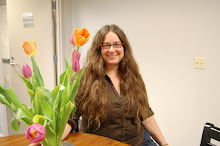One of my favorite models for a group theatre is a monastery.
We both strive for a higher purpose. We live in this world and the spirit one, and must live ethically in both. We pray and sweat. We live in metaphor, on faith, at the membrane of paradox. We act. For some reason, this is the thing we are called to do, and we're doing it.
A few years ago, frustrated with how hard it was to start a theatre company, I decided to become a buddhist monk. I am already buddhist, I just needed to learn the monk part. So I looked on the internet. I found excellent essays -- "How Will You Live When You're Old?" and "How Will You Live Right Now?" and "You And Your Family." Then one laid it all out.
"First you become a buddhist monk. You study with your teacher, live in your monastery, and practice. This takes years. Eventually, one day you must leave the monastery and go found your own. When you found your monastery, you must 1) pay yourself first -- because if you are not kind to yourself, you cannot be kind to others -- and 2) you must make your monastery into a thriving spiritual and economic center, able to support its own monks."
In other words, it's EXACTLY like starting a group theatre company.
Another similarity is that, although our Work is of value to the community, we often need supplemental forms of income. The Rule of Benedict, the Benedictine founder's manifesto, is a great guideline for how to run a self-sufficient monastery. There is a zen monastery that runs a bakery and restaurant. A catholic monastery builds webpages, as an extension of the scriptorium. Another monastery has a thriving recycled printer-toner business, which they started because they couldn't afford toner. Initially they sold only to non-profits, now they sell to anyone.
Julia Varley of the Odin Teatret, says, "You must find a way to connect to the community. Another way, other than the performances. It can be anything -- mime, Italian lessons, teaching gymnastics, digging."
This is one reason the Odin made such a big impression on me. They ARE a monastery, in their utter devotion to theatre practice, their hard work, and their self-sufficiency. Between their publishing branch, their films, their teaching, their seminars, their conferences, their grants, and their performances, they make it work. They have a company of about 26 people, including actors, technicians, and staff. Everyone in the company is paid the same. Everyone works in both realms, the spiritual and the mortal. Or to put it another way, some of the most senior and wise monks in the Odin are on the staff.
Andrew McMasters, artistic director of Jet City Improv, has his credo taped over his office doorway, facing his desk. "Every financial decision is an artistic decision. Every artistic decision is a financial one."
Eugenio Barba says, "Your job is to do whatever is necessary to get this work into the world."
I've said all this before. I come back to it because this is the stage I'm at right now -- done with the monastery, figuring out how to found one. And what kind to found.
"What do you need to start a theatre company?" I asked Leonid Anisimov once.
"You need one person who never loses contact with god," he said. "If you have that person, genius talent will come; money will come; help will come."
"I am that person," I thought, foreknowing. It would be six more years until I knew enough theatre to catch up.
Now I'm like Indiana Jones in that movie about his dad. He's at the edge of the chasm, almost to the grail, looking down. He tosses a pebble and it falls... f o r e v e r ... ... ... before landing, thousands of feet below. That's me right now. I'm tossing little sharp-edged dark-grey Alaskan glacial rocks, looking down.
The next step is to look up, find faith, and step into nothingness.
Eugenio is more bleak than Leonid. He would not say that contact with god is enough. He would, perhaps, say that all you have is the nothingness. "What you must do, you must do. And ask no questions." And, "Whatever you do, do it with your whole self."
This IS a slow-ten turn, and the whole world turns with my spine. Perhaps it takes a year to turn. Or perhaps the wind will gust and I will find myself, without having ever decided or solved this, suddenly on the far side of the problem.
I have a mala, a buddhist rosary of 108 beads, to count my mantras. Just now it strikes me -- THESE are my mantras, these oft-rubbed quotes from Leonid, Eugenio, Andrew. These are seed-algorithms. Sometimes I unpack them, sometimes I just let their rough texture comfort.
Om ah hung benzra guru padma sidhe hung
thank you, padmasambhava, for bringing the precious teachings to tibet
thank you, stanislavski & chekhov, for showing us it can be done
Friday, September 10, 2004
Subscribe to:
Post Comments (Atom)

4 comments:
Ahhh. We must talk. Waking this morning, I realized this whole post is a mantra. I think these thoughts, in pretty much this order, over and over. For me, theatre is profoundly a matter of faith. I'll take the Friary thread offline, into email.
Lovely. Truly.
... How can I help?
This is your book you're writing here Rachel. Unique.
If you like mantras, you might enjoy 'Healing Mantras' by Thomas Ashley-Farrand, the Ballantine Publishing Group 1999. First chapter is all about how he used mantras to help him get work! I've never tried that but it's a good book.
Post a Comment